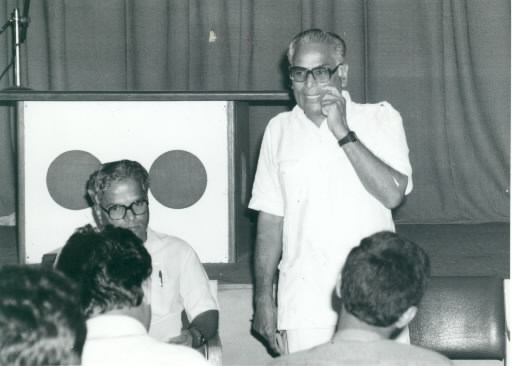7. Fighting for a Nuclear-free Zone in South Asia
Feb. 22, 2013
Chapter 4: India, Malaysia, Korea
Part 1: Living in the Shadow of Indian Nuclear Development
Part 1: Living in the Shadow of Indian Nuclear Development
"We demand that the new government of V.P. Singh tear back the veil of secrecy that has surrounded nuclear policy in this country for too long. The time has come for the government to acknowledge the damage done to the environment, and to conduct a survey to find out exactly how many people have been affected by radiation."
The speaker was Dhirendra Sharma, associate professor at Jawaharlal Nehru University. His audience consisted of thirty-five members of the Hyderabad Press Club. "Unfortunately neither those living close to nuclear facilities nor media people like yourselves know much about radiation. But I can assure you, the problem of contamination is extremely serious—one which includes exposure to radioactive substances from the nuclear fuel complex located not far from where we are now..."
Sharma's field is science policy. During the forty-two years from independence to the government of Rajiv Gandhi, no open debate on nuclear policy was permitted. In an effort to break down the wall of secrecy built up by successive governments, he formed the Committee for a Sane Nuclear Policy in 1981. Two years later, Sharma published a book, India's Nuclear Estate, based on the findings of a survey he had carried out himself, which was widely acclaimed as the first publication to criticize the government's atomic energy policy.
"They put a lot of pressure on me," he commented jovially. His failure to be promoted from associate professor is seen as one consequence of the publication of his book. Sharma refuses to give up the fight, though. He believes that democracy will never flourish anywhere without criticism. "Once a mistake has been made in science policy, it's almost impossible to retrieve the situation." Sharma's experiences of studying for long periods in Britain and the United States have also had a strong influence on his ideas.
The belief that atomic energy is the key to the country's development is deeply rooted among India's rulers. Political and military factors also play a part; in particular the longstanding border dispute with China and the equally longstanding conflict with Pakistan.
"Possession of nuclear technology is also seen as a kind of passport to developed-nation status," said Sharma. He showed us the latest five-year plan for the period up to 1990, which included a listing of the various areas of development allocated a percentage of the budget:
Atomic energy development: 15%
Space technology: 17%
Military: 37%
These three alone capture 69% of the budget. On the other hand, social services, including education and welfare, manage only 5%, while development of rural areas merits only 0.1% of the total expenditure.
"There are over eight hundred million people in this country, eighty-five percent of whom live in rural areas. Do they really think they're going to get rid of poverty with a pathetic 0.1% of the budget? It's inexcusable."
Sharma sees the emphasis placed on nuclear development as one reason why poverty is slow to disappear in India, particularly considering that the amount invested in atomic energy is totally out of proportion with the number of facilities actually in operation. "The damage done to the environment is inexcusable as well. The chairman of the Atomic Energy Regulatory Board, which is supposedly a watchdog organization, is on record as saying 'We don't have the money, the technology, or the equipment, so we have to rely on data supplied to us by the Department of Atomic Energy.' That seems to sum up the situation in India at the moment."
Sharma and other members of the Committee for a Sane Nuclear Policy appealed to the government for a moratorium on nuclear development. Their campaign has included a photographic exhibition of environmental damage and victims of radiation, which was held in all the major cities. The group has not confined its appeal to India—the members are calling for the whole of South Asia to be made a nuclear-free zone. "Pakistan can no more afford the expense of nuclear development than we can. The ideal thing would be for both countries to put a stop to all this stupidity."
It remains to be seen which the Indian government will find more important: a way out of poverty for its people or the continued development of nuclear power.








